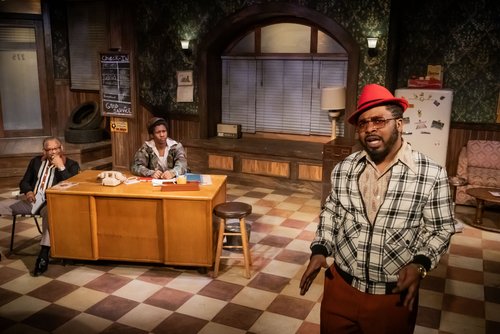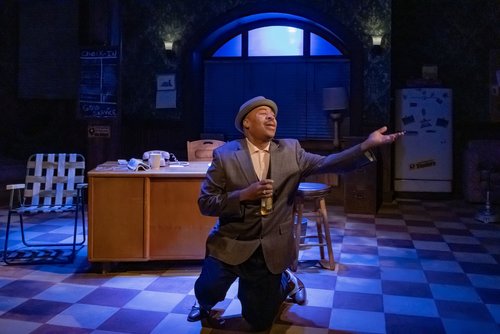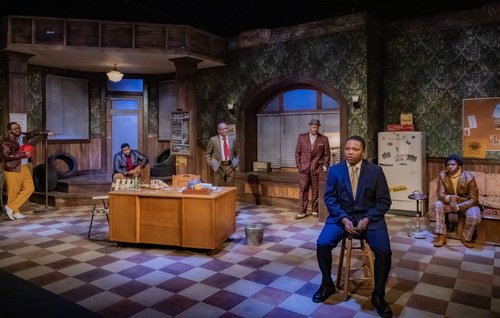August Wilson wrote Jitney in 1979, and its first production was in 1982 at the Allegheny Repertory Theatre in Pittsburgh, PA. Since then, the play has seen its revivals on Broadway (the 2017 Tony Award for Best Revival of a Play and the 2000 Drama Desk Award) and at regional theatres. The Beck Center for the Arts production of Jitney, directed by Jimmie Woody, speaks volumes about this work’s historical significance on one hand and its relevancy today on the other.
Set in a car service office—run by Becker (Darryl Tatum) in the Hill District between 1970 and 79, the story of Jitney follows immediately after Two Trains Running, which covers the decade between 1960 and 69. Jitney illustrates the story of the multigeneration of taxi drivers and how they impacted their communities. This play’s background is the modern transportation mode (automobiles) that gave mobility and freedom to Blacks and their lives. Yet, behind this appearance of “improvement” is permeating gentrification that pushes original residents out of the area, as they need to close their businesses and schools.
The central issues of the play are multiple. Yet, the most revealing one is a father-son relationship that August Wilson visited and revisited through his works. The paradox is that Becker functions as a leader and father for his employees but cannot play a satisfactory role as a father to his real—prodigal—son Booster (Patrick D. Warner), who has just been released from prison. Vietnam Vet Youngblood (Aamar-Malik Culbreth) finds his father figure in Doub (Pete Robinson), who teaches him and others the importance of patience, decency, and civility. Just like in Fences, the “father” needs to die dramaturgically. The strong resonance between the characters of Troy in Fences and Becker in Jitney is one of the attractions of the play for August Wilson fans.
Like Fences, there is one strong female character Rena (Thailand Hodge), a girlfriend of Youngblood who tends to make hasty and impulsive decisions. Though she is outside the story of seven adrenaline-drive male drivers, Hodge portrays, particularly in Act II, a young woman who becomes a responsible adult and partner who can stand up for herself, asserting what she and her family need.
Scenic designer Richard Morris built a super-realistic set in the center’s Studio Theater Two seating sections surround the performing space, avoiding the flatness often generated by a conventional proscenium stage. The office has a desk, different types of chairs, a couch, and a refrigerator. The floor has checkered patterns, suggesting a linoleum floor popular in the 1970s
The exterior and interior world of the taxi service’s office is a door with opaque glass. The continuing entrances and exits of the characters provide the punctuation and expectations needed for this 2-hour & 15-minute run. Colleen Albrecht’s lighting design emphasizes the contrast between brightness and darkness, giving dramatic moments charged by the characters’ emotions. Inda Blatch-Geib’s costumes illuminate so much about the 1970s with the checkered pants and bell bottoms. Each character shows their distinctive personality through the color schemes and tones.
The incessant ringing of the phone designed by Angie Hayes serves, like the door, the threshold between the small but intact world of Becker and his drivers and their clients. Woody and Hayes’ choice of music emphasizes the atmosphere of the 1970s decade—The O’Jays’ “Darlin’ Darlin’ Baby,” George Benson’s “Affirmation,” Deniece Williams’s “Free,” The Isley Brothers’ “The Pride,” and more.
This story takes place some years after the 1968 riot that damaged African American neighborhoods, their vibrant businesses, and their prospects. The ending of the play—very Shakespearean—provides some hope for the characters to continue working as cab drivers in the Hill District. However, the escalation of the neighborhoods’ gentrification and urban development plans is yet to come.
April 5 – May 5, 2024: Studio Theater
For more information visit beckcenter.org.
Download the press release for Jitney, here.
Photo Credit: Steve Wagner
Written by August Wilson
Directed by Jimmie Woody
Presented through special arrangement with Concord Theatricals
CAST:
Becker—Darryl Tatum
Rena—Thailand Hodge
Youngblood—Aamar-Malik Culbreth
Doub—Pete Robinson
Fielding—Royce Ruffin
Turnbo—Bryant Lyles
Shealy—Kym Williams
Philmore—Greg White
Booster—Patrick D. Warner












